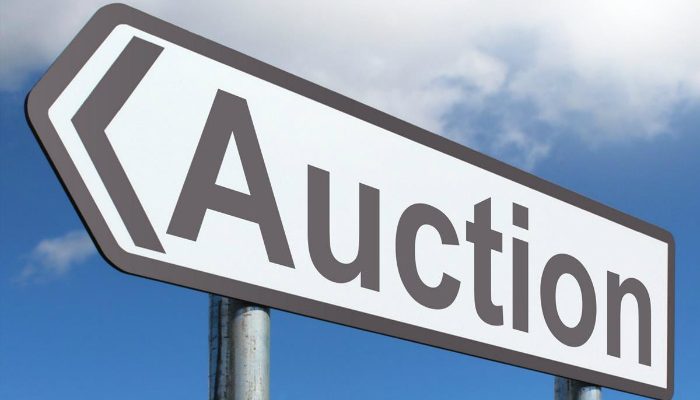Property auctions have risen in popularity over the last few years, thanks partly to the popularity of shows such as Homes Under The Hammer.
However, whether you want an investment property or somewhere you can call home, you’ll need to know how to buy a house at auction in the UK.
Here are the key things you’ll need to do before, during, and after the auction to ensure your auction buying experience goes as smoothly as possible.
Before The Auction
We start our guide on how to buy a house at auction in the UK looking at what you need to prepare. Buying a property at auction successfully is largely down to the work you put in before the auction.
View Properties You’re Interested In

When a property needs significant work carrying out, it’s common for it to be offered for sale via an auction. That means that when buying properties at auction you have to have your wits about you.
Not all properties at auctions are ‘doer-uppers’, but a large proportion will need improvements. Therefore, make sure you always view the property inside and out, so you know exactly what you are getting yourself into.
You might find our article on the 7 most common problems with auction properties useful as a guide of what to look out for.
Calculate An Improvement Budget
When you view the property, be sure to price up any work that needs doing after you have bought it. This could be anything from simple redecoration, through to more serious work such as rewiring or dealing with damp issues.
Whatever needs doing, make sure you plan out in detail how much you are likely to need to spend to bring the property up to scratch. If you cannot do all the work yourself, bring in tradesmen who can give you quotes for the work to help you complete your budgeting more accurately.
If the property needs a lot of work, or this is the first auction property you have bought, you may want to consider having a survey done. The downside is that you’ll be paying for a survey on a property you may not end up buying.
Yet, the upside is that it could save you a lot of money if the survey finds any serious problems such as structural defects that are not obvious to the untrained eye.
Get An ‘After’ Valuation
In order to decide what your maximum bid at the auction should be, you’ll need to know how much the property could potentially be sold for once brought up to modern standards.
To do this, ask an estate agent to provide a valuation of what it could potentially be worth if the work you’ve budgeted for is carried out to a good standard.
If you deduct your improvement budget from this figure it will give you a good idea what your maximum bid should be. Don’t forget though that there are several other costs such as legal fees that you’ll need to pay for. It’s wise to err on the side of caution when setting your maximum bid.
Also, make sure you are aware of any ceiling prices in the area you want to buy. In some areas, houses won’t sell for any more than the ceiling price.
This is important information for you, because it will help you decide what renovations you carry out. Extensions are a great way to create more space. But if there is a ceiling price, you might not be able to get back the money you invest in an extension.
A local estate agent will be able to give you this information. So make sure to ask about this.
Read the Legal Pack

Most auction properties will have a legal pack available to read before the auction. This will include information such as the fixtures and fittings that are included, local search results, title deeds, and so on. If the property is leasehold, it may also contain information about the lease terms.
It’s vital that you read this document before bidding, so you understand any legal quirks of the property. If you are not confident with the legal terms of the property market, instruct a solicitor to read the document for you and advise you on anything out of the usual that you need to be aware of.
Have Backup Options
Buying a property at auction isn’t easy. After all, you are bidding against seasoned property developers. So you have to be prepared that the property you have set your heart on will sell for over your maximum budget.
If you’re outbid, this is when you might lose your nerves and go over the budget you have set. That’s not unusual as the fear of missing out kicks in. To prevent this from happening, have backup options.
Choose more than one property that you would be happy to buy. Sure, it will mean more work beforehand, but you’ll increase your chances of buying a house at auction successfully.
Get Your Finances In Place
If you’ve got to this point and there’s still a property you are interested in, there’s just one more thing to do before auction day – get your finances in place.
When buying a property at auction, you’ll need to have the full purchase cost covered. If that means you need a mortgage, make sure you have a mortgage in principle in place. Keep in mind that you will be under obligation to complete the purchase within a set number of days after the auction (typically 30 days). Therefore, make sure you choose a lender that can keep up with these time-scales.
Also, keep in mind that at an auction, as soon as the hammer falls you will be required to pay 10% of the purchase price as a deposit. So, you’ll have to make sure you have the funds available on the day to do this.
The penalties for failing to complete an auction purchase within the stipulated time can be quite severe. For example, you could be liable for the costs of re-selling the property, any shortfall between the price you agreed to pay and the final sales price, plus interest for every day it takes to sell the property. It’s therefore vital to make sure all of your finances are in order before entering the auction room.
During The Auction

When you have done all your research and preparations, you are ready for auction day. And that’s the easy bid, right? Not really. Especially if it’s your first time, bidding at an auction can be a nerve-racking experience.
But fear not, our guide on how to buy a house at auction in the UK will help you to do the right things on auction day.
Take Your Documentation
If you are to buy a house at auction, you’ll need two forms of identification with you such as a passport or driving licence and a utility bill.
You’ll also need proof of funds such as a mortgage agreement in principle to show you have the financial means to complete the purchase at the agreed price.
Arrive Early

You’ll want to arrive at the auction in plenty of time so that you can relax, find a seat and watch the auction progress. Arriving early will be a particular advantage if you have not been to a property auction before as it will give you chance to watch how it’s done (assuming your property isn’t the first lot to be sold!).
When choosing your seat, try and sit directly in the eyeline of the auctioneer so that you don’t risk him missing you when you start bidding.
Stay Calm
It’s easy to get carried away in the heat of the moment and start bidding higher than you intended to go, or even on properties you never came to buy!
Stay calm at all times. Auctions are as much a game of wits as anything else. There will be other bidders trying to throw you off by playing games with their bidding such as leaving every bid to the last possible second or bidding higher than they need to.
The auctioneer may also play games, trying to pressure you into making one last bid or playing on your competitive side, so you don’t want to lose. Don’t fall for such tricks, stay calm, stick to your plan, and don’t worry what anyone else thinks of you.
Make It Clear You’re Bidding

Despite what many people believe, it’s hard to buy a property at auction simply by scratching your nose! Although auctioneers will look for subtle movements to indicate bidding, they will usually check that you intended to bid, especially if you haven’t yet placed a bid on that particular lot.
So, when you are intending to bid, make it as clear as possible. Raise your catalogue, bidder number, or even your arm as the auctioneer looks in your direction to make a clear indication you would like to bid. The first bid is always the most important as, once you’ve bid once, the auctioneer will know you are interested and will make a point of checking back in your direction for further bids.
Bid Early
By this, we don’t mean that you need to enter the bidding as soon as the lot opens. Sometimes it pays to bide your time and enter the bidding later on, once a few parties have dropped out.
However, it rarely pays to leave placing a bid until the last possible second, just before the auctioneers’ hammer falls. This is because it’s a very risky strategy as the auctioneer may not notice your bid, and you may lose out altogether.
For this reason, bide your time but try not to wait until the auctioneer calls out ‘for the third and final time’.
Stick To Your Maximum Bid
Remember all that work you did before the auction to work out what the maximum bid is that you can make on a property? Don’t let it go to waste.
It’s easy to get carried away and start increasing your maximum bid on the day. But, doing so is extremely risky and can be the difference between making money and losing money on a property.
You set your maximum bid for a reason. Stick to it and don’t let events on the day persuade you to start upping your budget.
This is probably the most important part of our guide on how to buy a house at auction in the UK. That’s because going over budget could mean making a loss. And no property investor wants that to happen.
After The Auction

If you’ve been successful in buying a property, congratulations! Now you’ll need to sort out all the paperwork with the auction house, including showing your identification and proof of funds and paying the deposit.
Remember, as soon as the hammer falls, the winning bidder is legally obliged to complete the purchase of the property. You cannot pull out without consequences. You’ll also be on a tight deadline to complete the purchase.
So, the sooner you can make all the necessary arrangements in terms of finances and legal work, the better. Providing you have your house in order so to speak, there should be no delays or unexpected issues at this point.
Conclusion – How To Buy A House At Auction In The UK
And that completes our guide on how to buy a house at auction in the UK. Preparation is key to buying a property at auction successfully.
Doing your research, reading the legal pack, viewing the properties and setting your maximum budget are all necessary work you have to put in before auction day.
During the auction, it’s important that you stay calm and stick to your maximum budget. Otherwise, you risk turning a potential profit into a loss.
But armed with this information, you can enter any auction room with complete confidence to secure your next property.
If you enjoyed this post, you may also enjoy our guide on the correct order to renovate a property as well as our recently announced top 10 tools for property investors.




